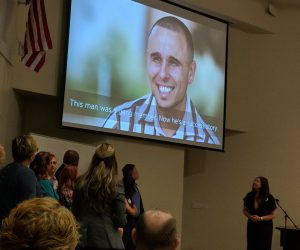
Founded in 2018, the Florida Prison Education Project (FPEP) is an initiative that seeks to offer a high-quality undergraduate education to people who are incarcerated in Central Florida.
Although the United States comprises only 5 percent of the world’s population, we house more than 20 percent of its prisoners. Since 1978, the U.S. prison population has increased by 408 percent with Florida’s incarcerated population rising a staggering 1,000 percent over the same time period with 100,000 people behind bars. Nearly 3 million people in Florida have a criminal record and Orlando has one of the highest incarcerations rates in the nation.
So, when the call was announced for applications for the Collective Impact Strategic Plan Community Challenge, Keri Watson knew she had to do something to work on these numbers. She wanted to provide higher education opportunities to incarcerated students.
Watson, an assistant professor of Art History in the School of Visual Art and Design, took part in Auburn University’s Alabama Prison Arts + Education Project (APAEP) during her time as an assistant professor there. It was one of the first programs of its kind, providing quality educational opportunities for people incarcerated in Alabama prisons. “I came to UCF in 2014 and knew that I wanted to be a part of something similar here, but then I blinked and it was 2017,” she said. “The idea has always been in the back of my head but suddenly everything fell into place.”
While she was attending a conference in the fall of 2017 she went to a breakout session on art education in prison and couldn’t believe it when the presenter was one of her former incarcerated students. “I watched him talk about how our program changed his life, how my class changed his life and knew it was time to start something at UCF.”
Things kept falling into place as Watson assembled her team from across the university, Cynthia Schmidt from Legal Studies, Sean Armstrong from UCF Connect, Tameca Harris-Jackson from Social Work, Jacquelyn Chini from Physics, Terry Thaxton from English and Steffen Guenzel from Writing and Rhetoric. Then they applied for UCF’s Community Challenge Initiative and won*.
Now the team is getting to work. “By 2020, an estimated 65% of all jobs will require postsecondary education, but most prisoners in Florida have limited access to higher education, despite the fact that statistical evidence overwhelmingly confirms that a college education reduces recidivism, increases employment opportunities, and strengthens communities. As the largest university in the state, UCF is well-positioned to bring transformative education to those behind bars,” Watson says.
To date FPEP has collected 1,000+ books for “Books Behind Bars” an on-going book drive for incarcerated individuals, offered three National Education Association-funded book discussions at a local correctional institution, the Central Florida Reception Center and served 52 incarcerated students.
To learn more about FPEP and what they are doing to transform lives and our community, visit their website.
*Two projects received this designation, the other is “Collectively Confronting and Resolving the Injustice of Human Trafficking” led by John Bersia and Martin Dupuis.